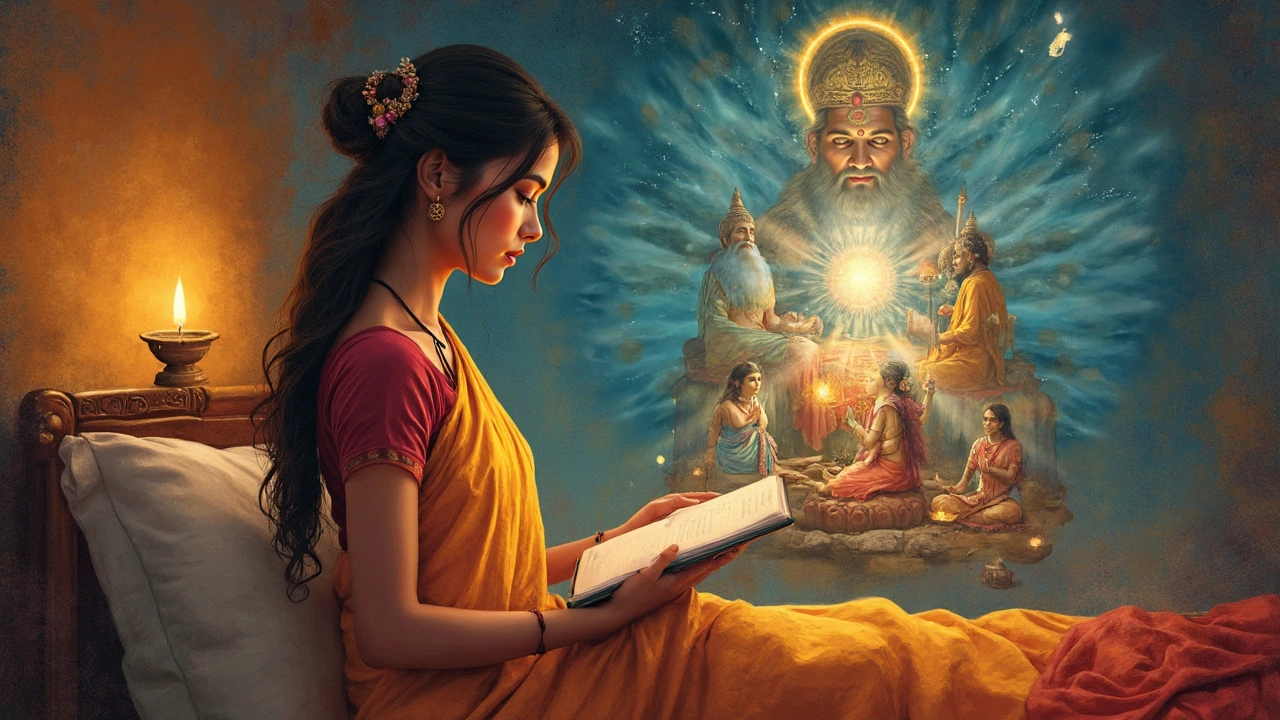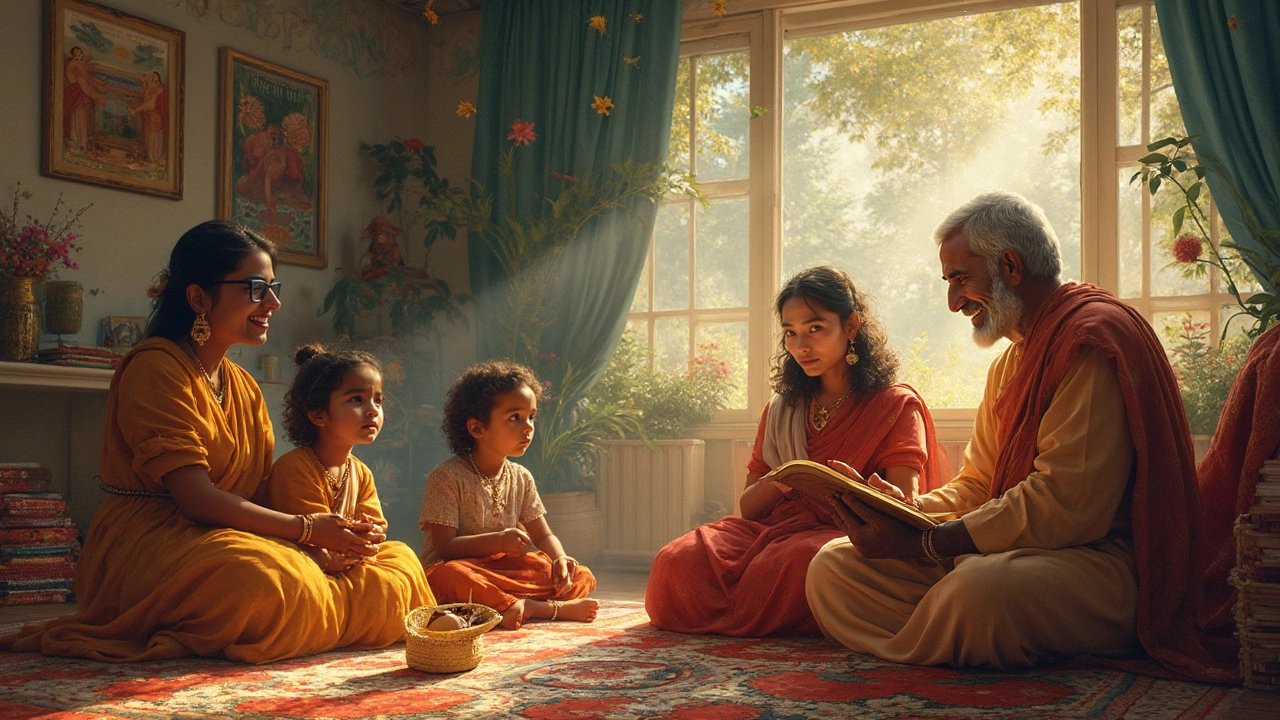Ever wake up from a wild dream and wonder if it actually means something? In India, most folks take dreams seriously—no, not just as bedtime stories your brain cooks up, but as a real way the universe or your own mind tries to talk to you. In Hinduism, there's this long-standing idea that your dreams aren't just random. They can be signs, warnings, or even reminders from past lives or higher powers.
Instead of shrugging off strange dreams, many people here look for clues. Did you know there's even an old saying: "Sapna bhi ek sandesh hai"—which means, "Even a dream is a message"? If you've got big questions or feel stuck in life, paying attention to what goes down when you close your eyes could point you in new directions. Dreams have guided kings, inspired poets, and left plenty of people in India scratching their heads, searching for answers in the morning.
- How Hindus View Dreams
- Ancient Scriptures and Dream Meanings
- Types of Dreams: Good, Bad, and Weird
- Famous Quotes and Stories
- Practical Tips for Understanding Your Dreams
How Hindus View Dreams
In Hindu culture, dreams aren't just brain static. They actually get a lot of attention in old texts and people still talk about them over chai in the morning. A dream can be a heads-up about your future, a reminder about unfinished business, or even a message from the universe itself. There’s a reason Hindu families sometimes bring up a weird dream during breakfast—folks see real value in breaking it down and figuring out what it might mean.
The ancient scriptures, especially the Upanishads and the Atharva Veda, go deep into dream talk. Hinduism splits sleep and dreaming into stages, saying every stage connects with different layers of your mind and soul. Most believe a dream isn’t random. It might be the mind digging through old memories, karma, or even giving you a nudge about something coming your way.
| Scripture | How Dreams Are Described |
|---|---|
| Brihadaranyaka Upanishad | Dreams reflect desires, fears, and even hint at the afterlife |
| Atharva Veda | Gives ways to interpret dreams as good or bad omens |
| Garuda Purana | Categorizes dreams and links them to real-life results |
Some Hindus go as far as to change their daily choices based on what they saw in a dream. For example, seeing water or fire in a dream can be taken as an actual warning sign, depending on the context. And it's not all superstition—sometimes, dreams have helped families avoid trouble, or inspired them to chase a goal. Fun fact: about 36% of Indian adults said in a 2019 survey they’ve made a life decision after a dream they found important.
So when you hear people calling dreams just "normal sleep stuff," remember, in Hinduism, they're treated as more than that. Dreams are seen as a sort of secret chat between you, your mind, and the world beyond.
Ancient Scriptures and Dream Meanings
Hindu texts take dreams way more seriously than you might expect. If you check out the Upanishads, for example, dreams are described as one of the main ways your deeper self communicates—it’s not just your brain being weird at night. In the Brihadaranyaka Upanishad, dreams sit in the middle, between waking and deep sleep. This is where your thoughts can go wild but also where you can hear important messages about your life path.
Let’s get to the concrete stuff. The Garuda Purana and Ramayana have lists of dreams people should actually pay attention to. For example, seeing water or fire in a dream? According to the Garuda Purana, water hints at change or travel, while fire can sometimes mean trouble or loss—but if you come out unharmed, it also means you’ll overcome problems soon. It gets super specific: seeing elephants or cows is considered lucky and hints at wealth or family happiness.
Check out this handy summary of what some dreams mean, straight from scriptural sources:
| Dream Symbol | Scripture | Common Meaning |
|---|---|---|
| Water | Garuda Purana | Change or journey |
| Fire | Garuda Purana | Problems or coming success |
| Snake | Ramayana | Big changes or hidden worries |
| Elephant | Brihadaranyaka Upanishad | Luck, money, respect |
| Falling | Common in many texts | Anxiety or loss of control |
One famous bit from the Mahabharata tells of a character having vivid dreams before a big battle—they basically get a warning about what’s going to happen. It’s not all about doom and gloom; good dreams, like flying, seeing gold, or being fed well, usually mean blessings on the way.
So, when people ask “What do Hindus say about dreams?” the answer is, these ancient scriptures see dreams as a mirror, showing both your hopes and what’s brewing underneath the surface. Don’t ignore that next wild dream. It could have a message—a concept that’s been part of Hinduism for thousands of years.

Types of Dreams: Good, Bad, and Weird
In Hindu thinking, not all dreams are made the same. They say some dreams might actually warn you, guide you, or even bless you. Let's sort them out into what people call good, bad, and just plain weird dreams.
According to the texts, especially the Garuda Purana and Brihadaranyaka Upanishad, the time you see a dream actually matters. Unreal, right? Here’s what gets mentioned a lot:
| Dream Time | Meaning |
|---|---|
| Early in night | Usually not meaningful - might just be daily thoughts |
| After midnight/early morning | Often seen as significant and more likely to come true |
Now, let’s look at types of dreams you might get:
- Good dreams – These include things like seeing gold, clear water, gods, prayers, or flying. In Hindu belief, dreaming of milk, elephants, or getting blessings signals luck on the way. If you see yourself smiling or dressed in new clothes, it’s a good sign. Many say dreams like this mean your efforts will pay off soon.
- Bad dreams – Seeing yourself falling, getting hurt, losing teeth, snakes attacking you, or wandering in darkness? Not the best. Old Hindu scriptures say these dreams can point to struggles, stress, or even health problems. If you often see fire or dead bodies, take it as a heads-up to be careful and maybe avoid risky moves for a bit.
- Weird or confusing dreams – Ever seen yourself talking to ancestors you never met? Or maybe fighting with someone, but you can’t remember the face? Hindu wisdom says dreams like these might be tied to things you haven’t resolved, either in family or your own mind. Sometimes, these dreams are just leftover daytime thoughts, but other times, people think they are messages from your deeper self.
Some folks even track their regular dream patterns. Studies in India found almost 45% of people saw at least one "meaningful" dream a month—meaning they changed a decision or discussed it with family after.
If you wake up remembering bits and pieces, write them down right away. That’ll make it way easier to spot if there’s any kind of pattern or if something really stands out.
Famous Quotes and Stories
If you look at the old epics and stories in India, dreams pop up more often than you'd think. There's one from the Mahabharata where Lord Krishna tells Arjuna, “The world you see in the day is no more real than the one you see in your dreams at night.” Talk about making you question everything, right? This quote has become almost a classic among people who want to understand life through a Hinduism lens. It basically says that what we dream might reveal truths invisible to our waking eyes.
Take King Janaka’s story from the Upanishads. He dreamed he lost his throne and everything dear to him. When he woke up, he was puzzled: which life was real, the one in his dreams or what he saw now? The famous sage Ashtavakra told him, "Both are fleeting. The only truth is the Self." That story keeps showing up in spiritual circles, reminding folks not to get too attached to their dreams—or their daily routines.
Then you’ve got Kalpana Chawla, the first Indian woman in space. She once said her journey started as a dream, literally—a childhood dream about flying, which she just refused to forget. Stories like hers often make their way into graduation speeches, school books, and family advice sessions. The message? Sometimes, a dream is more than just a story—it can set your real-life goals.
Here’s a quick table showing how dreams have been viewed at different points in Indian culture:
| Time Period | Role of Dreams | Famous Quote/Story |
|---|---|---|
| Ancient (200 BCE+) | Seen as signs from gods or fate | Mahabharata: “The world of dreams is as real as the world of waking.” |
| Medieval | Dreams as lessons for kings and gurus | King Janaka’s realization in the Upanishads |
| Modern | Dreams as inspiration and life goals | Kalpana Chawla’s literal dream of space |
It’s not just big names or mythology. Regular families in India talk about dream stories all the time. If someone dreams of snakes, elders might suggest checking out old dream dictionaries or even consulting a priest. If you hear a relative is chasing their dreams, there’s a good chance they mean it quite literally. For a lot of people, dreams are a kind of secret map—they help you figure out what your real job or journey might be.

Practical Tips for Understanding Your Dreams
If you've ever woken up from a dream and thought, "What was that even about?", you're not alone. Understanding dreams isn't just some mysterious art—there are actual steps you can take to remember and make sense of them. In Hinduism, dreams are seen as possible messages, but it helps to know how to unlock those messages the right way.
- Keep a dream journal by your bed. Write down your dreams as soon as you wake up, even if they seem weird or incomplete. Over just a week, you might start noticing patterns or repeat themes.
- Notice your feelings. Often, Hindu texts say the emotional "vibe" of a dream matters as much as the dream itself. Did you feel scared, happy, or confused? Jot that down—sometimes it's more important than the actual scenes.
- Watch what you eat before bedtime. Ayurveda, a traditional Indian health practice, suggests that heavy or spicy foods late at night can cause strange or restless dreams. If you're hoping for calmer or clearer dreams, try lighter meals in the evening.
- Look for classic symbols. Some symbols keep popping up in Indian dream stories: snakes could mean hidden worries or transformation, water often hints at life changes, and flying is usually a sign of freedom. If these show up, check what’s happening in your life right now.
- Don’t panic about nightmares. Hindu wisdom says a nightmare doesn’t mean something bad will definitely happen. It could be your mind’s way of processing stress. Try meditating or taking deep breaths before bed to help with this.
For those curious about how often people remember their dreams, here’s a quick look:
| Habit | Chance of Remembering a Dream |
|---|---|
| Writing dream journal | 70% |
| No journal | 23% |
| Going to bed stressed | 18% |
| Practicing relaxation/meditation | 65% |
If you really want to make sense of your dreams, the combo of writing them down and practicing a bit of mindfulness before sleep makes a big difference. Try it out, and don’t be surprised if that puzzling dream starts making a lot more sense.
